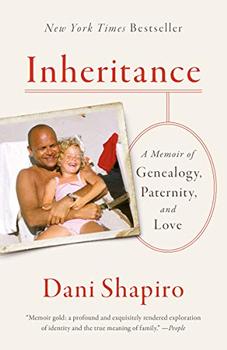Summary | Excerpt | Reading Guide | Reviews | Beyond the Book | Read-Alikes | Genres & Themes | Author Bio

A Memoir of Genealogy, Paternity, and Love
by Dani ShapiroThis article relates to Inheritance
 Early on in Inheritance Dani Shapiro agrees to order a DNA test through Ancestry.com along with her husband after he suddenly becomes interested in genealogy. The results of Shapiro's kit happened to be life changing, upending everything the memoirist thought she knew about her family history. Her experience is extraordinary, but there are some important ethical and privacy-related concerns that one should take into account before signing up for a genealogical service.
Early on in Inheritance Dani Shapiro agrees to order a DNA test through Ancestry.com along with her husband after he suddenly becomes interested in genealogy. The results of Shapiro's kit happened to be life changing, upending everything the memoirist thought she knew about her family history. Her experience is extraordinary, but there are some important ethical and privacy-related concerns that one should take into account before signing up for a genealogical service.
Critics of genetic testing companies like Ancestry.com worry about the privacy of DNA test results. A recent study published in the journal Science has indicated that genetic databases currently allow for the identification of about 60% of white Americans from an anonymous DNA sample. Even if a person has never given their DNA to a database, they still might be identified because of how similar their DNA is to that of relatives who have donated. The percentage is lower for Americans of color, but researchers estimate that within a decade nearly everyone will be identifiable using genetic databases through a combination of DNA samples and basic information such as age. The increasing availability of genetic data, combined with a lack of robust legislation on genetic privacy, means that in the future the results stored on genealogy sites could be easily retrieved and exploited by hackers, corporations, insurers and law enforcement officials.
Some people also have critiqued Ancestry.com in particular for what they perceive to be the company's theft of customers' DNA ownership rights. Joel Winston of ThinkProgress has explained how the site's privacy policies allow it to assume ownership of customers' DNA forever, unless they explicitly withdraw their consent. Once Ancestry has someone's genetic data, it can monetize that data for use in commercial research projects. The site also bears no legal responsibility for any damages it purposefully or incidentally causes customers, a pressing concern considering that disability and life insurance companies can access the site's data and then legally deny coverage based on genetic predispositions toward illnesses. Those donating their DNA to Ancestry are unwittingly exposing themselves, as well as their relatives, to several risks.
Aside from ethical questions about genetic testing, there exists a practical issue with genealogy services in general: they tend to mislead interested customers about what they can offer. Tina Hesman Saey of Science News has argued that genetic testing can't tell customers much about what kind of diet and exercise routines will be successful for them, despite the fact that many services claim otherwise. Sites like DNAFit offer to create specialized fitness and diet plans based on customers' genetic test results, but studies conducted by Stanford University have shown that an individual's genetic makeup has little to do with what diets or exercise programs will be effective for them.
In spite of critics' concerns about sites like Ancestry, 23andMe, and Family Tree DNA, genealogy services have skyrocketed in popularity in recent years. More people took genetic ancestry tests in 2017 than in all previous years combined, MIT Technology Review reports, and about 1 in 25 American adults now have access to personal genetic data. The surge in testing appears to be the direct result of ancestry websites' increased spending on advertising, and new genetic analysis services might soon pop up in response to heightened consumer demand. As noted by Howard Hochhauser, Interim Chief Executive Officer of Ancestry, DNA testing is no longer a niche interest, but a mass consumer market that only continues to grow.
The implications of that market's rapid expansion remain to be seen, but consumers would do well to remember the shortcomings and limitations of genealogy services before rushing to seek them out.
Ancestry.com DNA test, courtesy of Mashable
Filed under Medicine, Science and Tech
![]() This "beyond the book article" relates to Inheritance. It originally ran in January 2019 and has been updated for the
January 2020 paperback edition.
Go to magazine.
This "beyond the book article" relates to Inheritance. It originally ran in January 2019 and has been updated for the
January 2020 paperback edition.
Go to magazine.
Your guide toexceptional books
BookBrowse seeks out and recommends the best in contemporary fiction and nonfiction—books that not only engage and entertain but also deepen our understanding of ourselves and the world around us.